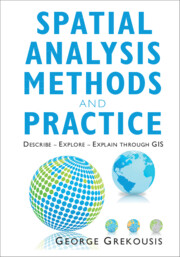Book contents
- Spatial Analysis Methods and Practice
- Reviews
- Spatial Analysis Methods and Practice
- Copyright page
- Contents
- Preface
- 1 Think Spatially
- 2 Exploratory Spatial Data Analysis Tools and Statistics
- 3 Analyzing Geographic Distributions and Point Patterns
- 4 Spatial Autocorrelation
- 5 Multivariate Data in Geography
- 6 Modeling Relationships
- 7 Spatial Econometrics
- References
- Index
7 - Spatial Econometrics
Published online by Cambridge University Press: 20 May 2020
- Spatial Analysis Methods and Practice
- Reviews
- Spatial Analysis Methods and Practice
- Copyright page
- Contents
- Preface
- 1 Think Spatially
- 2 Exploratory Spatial Data Analysis Tools and Statistics
- 3 Analyzing Geographic Distributions and Point Patterns
- 4 Spatial Autocorrelation
- 5 Multivariate Data in Geography
- 6 Modeling Relationships
- 7 Spatial Econometrics
- References
- Index
Summary
This chapter deals with
Spatial econometrics notions
Handling spatial dependence and spatial heterogeneity through spatial econometric models
Diagnostics for spatial dependence (Lagrange multiplier tests)
Spatial autoregressive model (SAR)
Spatial error model
Spatial filtering
Spatial regression with regimes
Spatial two-stage least squares (S2SLS)
Maximum likelihood
Generalized method of moments (GMM)
After a thorough study of the theory and lab sections, you will be able to
Distinguish which spatial regression method to use in order to account for spatial dependence and spatial heterogeneity
Interpret spatial diagnostics used in OLS regression that can guide you to the appropriate spatial regression model
Build spatial regression models and interpret results
Identify if spatial dependence or spatial heterogeneity is accounted for by the adopted method
Conduct spatial econometric analysis through GeoDa space
Keywords
- Type
- Chapter
- Information
- Spatial Analysis Methods and PracticeDescribe – Explore – Explain through GIS, pp. 451 - 504Publisher: Cambridge University PressPrint publication year: 2020
- 1
- Cited by

